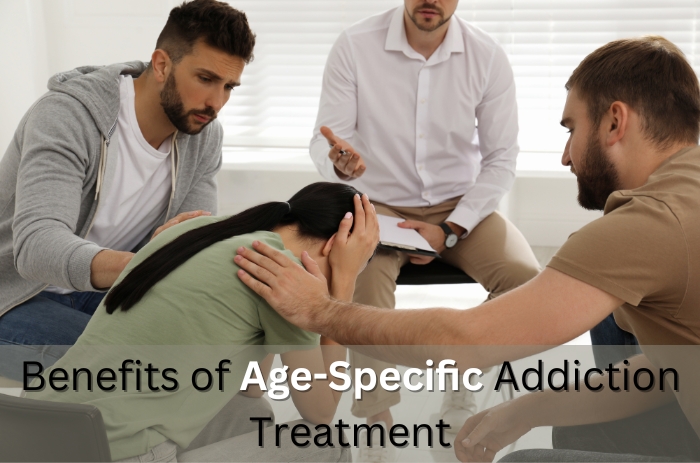People from all walks of life can struggle with issues of alcoholism and addiction no matter what age or where they are from. Young people can have addictions even before they reach the age of 21 and older adults can still have addiction problems even later in life after their children have grown up. Certain age groups can have varying needs and so age specific rehabs are useful programs to cater to individual demographics.
There are many different kinds of rehabs designed to provide patients with what they need to recover so that they aren’t left behind. More traditional “one size fits all” programs can be less effective for people that feel they need something more personal that will adjust to their specific issues. Age specific rehabs are just one of many different types of programs that are created in order to be a more personalized type of recovery.

What is Age-Specific Rehab?
Age-specific rehab refers to rehabilitation programs or interventions specifically designed and tailored to meet the needs of individuals within a particular age group. Rehabilitation is a multidisciplinary approach aimed at helping individuals recover, regain function, and improve their overall quality of life.
Age-specific rehab recognizes that different age groups may have unique physiological, psychological, and social considerations that impact their rehabilitation process. By targeting specific age groups, rehab programs can better address challenges and goals within those populations.
People in different age groups are at specific stages in their life when addiction may affect them in unique ways. A young person may have a very different relationship to drugs or alcohol than an older person that is addicted. Age specific rehabs allow people to focus on what will help them at the stage they are in life.
How Does Age Impact Drug Use and Treatment?
People age can have various impacts on Drug Use and Treatment, including:
- As people age, their bodies change in ways that affect how they metabolize and respond to drugs. For example, older adults may have slower liver and kidney function, which can lead to drugs staying in their systems for longer. This can increase the risk of overdose or other adverse effects.
- Older adults are also more likely to have mental health conditions, such as depression or anxiety. These conditions can increase the risk of substance abuse, and they can also make it more difficult to recover from addiction.
- Retirement, loss of a spouse, or other major life changes can also increase substance abuse risk in older adults. These changes can lead to feelings of loneliness, isolation, or stress, which can lead to drug use as a way to cope.
- There are fewer specialized treatment programs for older adults than for younger adults. This can make it difficult for older adults to find the help they need.
Long Term Success with Tailored Rehabs

An age specific rehab can provide people with a way to achieve long term success because it is tailored to their personal needs. Young and old people may have dramatically different ideas about addiction and will understand their problem in various ways. A person’s generation and the way that they grew up can shape their concept of drug use and influence their behavior.
Older generations for example may feel more ashamed about their alcohol or drug use and might have a harder time opening up in front of others. They also may feel more ashamed because they have a career and a family that they might have harmed through their addiction. They have more responsibilities that they have jeopardized through their drug use and need to get their life back on track.
Younger people may prefer to be in a room full of other young people because they might feel more intimidated around people that they consider to be an authority. Going to a drug rehab center with older people may make it more difficult for them to relate to other people’s stories. They may worry that they won’t be taken seriously or will be judged for their young age.
There are a wide range of issues that can come up regarding a person’s age in rehab. Being around people of a similar age group and getting tailored treatment based on the group’s age can make it easier to succeed. Whatever feelings the individual has about their age,they will not have to worry about it in an age specific rehab.
Rehabilitation and a Sense of Community

One of the most important aspects of rehab is building up a sense of community among the patients in the program. This can be much easier with a group of people that are in similar stages in life and can find things in common. A group with widely varying ages might feel a sense of disconnect from one another because they are experiencing very different things with their addiction.
People like to be around peers and feel more comfortable around those that they have more in common with. If they grew up in a particular era then they will have more common ground on which to build a relationship. An older generation may find it difficult to relate to the things that younger people experience in their modern upbringing.
A critical aspect of rehab is being able to connect, feel a part of a community and develop a social support network of people for help in the future. Patients will need someone that they can talk to when experience triggers or are worried about their ability to stay sober in any given moment. Connecting with people their same age will make it easier to create a support network and have someone to call or lean on in times of stress.
People need to recover in an environment where they feel comfortable, can open up and be themselves around people that may become lifelong friends. Age specific rehabs can help foster that sense of community and comfort that would be more difficult to experience in a rehab with some people that are very young, middle aged or in their senior years. People tend to spend more time with others in their own age group and rehab is a place the requires a kind of connection and bond with each other.
The Benefits of Age-Specific Addiction Treatment

Age-specific addiction treatment can provide several benefits for substance abuse recovery. This type of treatment can be beneficial for a number of reasons, including:
- Targeted Support: Age-specific treatment programs are designed to address the unique needs and challenges of individuals within a specific age group. This targeted support allows for more relevant and effective interventions that consider factors such as developmental stages, life transitions, and age-related health considerations.
- Peer Connection: This treatment brings together individuals with similar life experiences and challenges. Connecting with peers facing similar circumstances can foster a sense of belonging, understanding, and support. Peer support can be a powerful motivator on the recovery journey.
- Tailored Therapeutic Approaches: Age-specific treatment programs can utilize therapeutic approaches tailored to the specific age group. These approaches may incorporate age-appropriate therapy modalities, educational materials, and relapse prevention strategies that resonate with individuals in that particular age range.
- Addressing Age-Related Concerns: Teens, adults, and seniors all have unique age-related concerns. For example, older adults may require additional support in managing health conditions or addressing retirement’s emotional impact. Age-specific treatment can address these concerns directly, enhancing the overall effectiveness of the treatment process.
- Comprehensive Care: Age-specific treatment programs often provide a comprehensive approach that addresses not only substance abuse itself but also related factors such as mental health, physical health, and social well-being. These programs may incorporate integrated services such as medical care, counseling, vocational support, and family involvement to promote holistic recovery.
If you are looking for a rehab that caters to your individual needs, an age specific rehab may be a good choice for your recovery.




